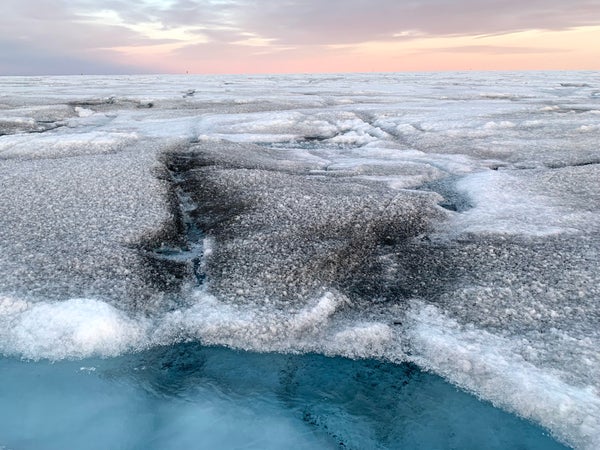Giant Viruses Discovered in Arctic Ice Could Slow Sea-Level Rise
Scientists recently discovered giant viruses infecting algal blooms that dot the Greenland ice sheet
By Francisco “A.J.” Camacho, Chelsea Harvey & E&E News

Several areas in Greenland are covered with black algae, which could speed ice melt by absorbing sunlight.
Laura Perini
CLIMATEWIRE | Hordes of giant viruses are living on the world’s second-largest body of ice — and may be slowing the impacts of climate change.
Scientists announced the discovery in a recent paper on the Greenland ice sheet. Some of the viruses, they say, have infected algae, potentially limiting the growth of colored snow blooms that can speed up ice melt and raise global sea levels.
“They infect the microalgae,” said Laura Perini, one of the paper’s lead authors and a researcher at Denmark’s Aarhus University. “If they kill the algae, … then they kind of reduce the speed with which the ice is melting.”
On supporting science journalism
If you’re enjoying this article, consider supporting our award-winning journalism by subscribing. By purchasing a subscription you are helping to ensure the future of impactful stories about the discoveries and ideas shaping our world today.
The Greenland ice sheet is the largest single contributor to global sea level rise. Algae can darken the surface of the snow, causing it to absorb more sunlight and melt at faster rates.
Researchers suspect that the newly discovered viruses help control that algal growth.
That theory isn’t yet confirmed — and scientists aren’t sure exactly how much algae contributes to melting on the Greenland ice sheet. But algal blooms are growing larger as the planet warms, Perini said, making it important to investigate the factors that affect their growth.
Since being classified in the 1980s, scientists have found giant viruses — or nucleocytoplasmic large DNA viruses — all over the world in soil, rivers and oceans. Perini and her team wanted to find out if they also inhabited icy Greenland.
Researchers conducted genetic analyses on samples taken from the ice sheet. They found viral genes hiding in algal cells, indicating that the viruses have been infecting the algae populations for a while — likely hundreds of years.
Those pathogens are likely killing algae cells and obstructing the growth of blooms, though that was not investigated in the paper, said Frederik Schulz, a microbiologist at Lawrence Berkeley National Laboratory and one of the world’s top giant virus researchers.
“We have some examples that are reasonably well studied” of marine algal blooms, Schulz said in an interview. “Giant viruses play a role there in terminating the algae.”
If the viruses are keeping the algae population in check on the Greenland ice sheet, he said, that would mean they are allaying climate-driven global sea-level rise.
“It’s nice to find cases where giant viruses potentially could be useful,” said Schulz, who was not involved in Perini’s study. “What if you would introduce this virus for, like, a targeted removal of those colored algae potentially to reduce the melting of the glacier?”
Schultz said that may not be a good idea — algae have other functions, like storing carbon — but the study indicates it’s worth exploring and puts the idea “on my radar.”
Marco Tedesco, a glaciologist at Columbia University who has studied the Greenland ice sheet for years, said the new paper investigates important questions about the factors controlling algae growth.
“What they did was amazing with the DNA,” he said. “This is one of the best studies I’ve seen in years in this field.”
But what it all means for Greenland’s future melt rates remains unclear, he added.
That’s because scientists don’t know exactly how much ice algae melts.
Multiple studies have confirmed that algae’s darker hues play some role. A 2020 paper found that on some parts of the ice sheet, between 9 and 13 percent of meltwater runoff is due to algae.
But there are a lot of other factors that may also affect how Greenland’s ice sheet responds to warming temperatures, Tedesco added.
As the ice sheet melts, for instance, pools of dark-colored water may collect on the surface. These ponds can also increase the absorption of sunlight and cause even faster melting. It’s unclear how those processes might interact with the growth of algae in the coming years.
Perini said other microbes might also be helping control the algae. Her next paper will look into parasitic fungi that infect algae.
A lot more data is needed, Tedesco said. And that requires major coordinated research projects, he said, spanning multiple regions of the Greenland ice sheet and involving scientists across many different disciplines, from glaciologists to microbiologists.
“From a climate point of view, we need the support of large-scale scalable experiments,” Tedesco said.
Reprinted from E&E News with permission from POLITICO, LLC. Copyright 2024. E&E News provides essential news for energy and environment professionals.
>>> Read full article>>>
Copyright for syndicated content belongs to the linked Source : Scientific American – https://www.scientificamerican.com/article/giant-viruses-discovered-in-arctic-ice-could-slow-sea-level-rise/










